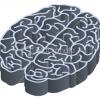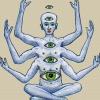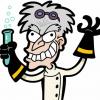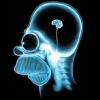I'm really surprised no one on this forum talked about this new compound
it is currently in trial for Anxiety, Depression, Alzheimer, Memory loss, Stroke, CTE
http://depressionhea...ssive-disorder/Neuralstem, Inc., manufacturers of a potential new treatment for major depressive disorder (MDD), have recently announced that the Food and Drug Administration (FDA) have approved the advance to Phase 1b in the ongoing clinical trial to test its neuroregenerative compound, NSI-189.
NSA-189 is a proprietary new chemical entity that stimulates new neuron growth in the hippocampus, an area of the brain believed to be contributory in MDD and other conditions, such as Alzheimer’s disease and Post-traumatic stress disorder (PTSD). Phase 1b of the clinical trial is to test the safety and tolerability of the drug in depressed patients.
Karl Johe, PhD, Chief Scientific Officer and Chairman of Neuralstem’s Board of Directors, said, “We are pleased to be approved to begin testing NSI-189 in patients who suffer from depression. Loss of hippocampal volume is a known characteristic in depressed patients. NSI-189 stimulates neurogenesis and increases hippocampal volume in healthy adult mice, at the same time reversing behavioural symptoms in mouse depression models, so it could address depression at the source.”
Maurizio Fava, MD, Slater Family Professor of Psychiatry at Harvard Medical School and Executive Vice Chair of the Department of Psychiatry at Massachusetts General Hospital, is a leading researcher into MDD and helped to design the Neuralstem trial, added, “It is exciting to see a new class of drugs that potentially offers a novel and different approach to this disease moving into patients.”
Neuralstem’s technology enabled the creation of neural stem cell lines from areas of the human CNS, including the hippocampus, a part of the brain involved in memory and the generation of new neurons. From this, Neuralstem has created virtually unlimited amounts of mature human neurons and glia in laboratory dishes which can be used to mimic the natural brain environment to test the drug’s effects.
NSI-189 is the lead compound in Neuralstem’s neuroregenerative small molecule drug platform, which the company plans to develop into orally administered drugs for MDD and other psychiatric disorders, such as anxiety, bipolar disorder, PTSD and Alzheimer’s disease. In previous tests, NSI-189 significantly improved behavioural responses associated with depression. In humans, it may reverse the human hippocampal atrophy seen in MDD and other disorders, reversing their symptoms.
The NSI-189/MDD trial is a double-blind, randomised, placebo-controlled, multiple-dose escalating trial evaluating the safety, tolerability, pharmacokinetics and pharmacodynamic effect of NSI-189 in the treatment of MDD. Phase 1a tested escalating doses of single administration in healthy patients. Phase 1b will test the safety of escalating doses for 28 daily administrations in 24 depressed patients, and will take approximately 6 months to complete.
The Defense Advanced Research Projects Agency (DARPA) and the National Institutes of Health (NIH) are in full support of Neuralstem and their program.
http://www.neuralste...-in-development
What do you think about it? future blockbuster ? a drug that increase the size of the hippocampus rather than increasing existing neurotransmitters is a revolution
http://gizmodo.com/5...wing-your-brainThe Pill That Could Cure Depression by Growing Your Brain
If you are depressed, or schizophrenic or have Alzheimer's, scientists say you probably have a shrunken hippocampus. The good news: a drug that just entered human trials promises to re-grow that part of the brain.
It's an entirely new approach to treating clinical depression, which is the first of several diseases scientists at biotech company Neuralstem are hoping to address with their experimental oral drug. Most antidepressants work on brain chemistry, tweaking levels of neurotransmitters including serotonin, norepinephrine, and dopamine. This is the first drug that aims to re-grow patients' atrophied brains.
Dr. Karl Johe, Neuralstem's chief scientific officer, believes that depression is a three-headed beast that affects neurotransmitter levels, neurons, and hippocampus size. And he says their new drug could address all three. He also hopes the drug will reverse the disease to the point that patients could permanently go off the drug.
"If we can show by MRI that we've increased hippocampus volume and at the same time reversed depression symptoms for six months after patients have stopped taking the drug, then we'll have a cure."
That a too-small hippocampus causes depression and other diseases is still technically a theory in humans (though it's been demonstrated in rats and chimps). So if the drug grows hippocampus volume and thereby treats depression, we'll not only have a new treatment, but the study results would be proof that a shriveled hippocampus is at least in part the culprit.
The scientists showed first that the drug worked in the lab: They started with dishes of neural stem cells and added several compounds they thought might instigate growth. Seven showed promise, but they could only afford to develop one, so they chose NSI-189. They then tested it in mice; after taking the drug, the rodents had larger hippocampi.
Thirty-five healthy humans have now taken the drug with no ill effects, so the FDA gave the company the OK to start testing in depressed patients. They'll give the pill to 18 volunteers (six will get a placebo) in three groups, each receiving a progressively larger dose, each over 28 days. They expect this phase, which is mainly to make sure the drugs is safe, to take about six months. If all goes well they hope to proceed to phase two clinical trials later this year, which will test to determine whether the drug is both safe and effective. (After that, a final phase three trial to confirm safety and efficacy will remain before the company can market the drug.)
I couldn't help thinking about those healthy test subjects who took the drug. Will they get super brain powers? The healthy mice that received the drug did grow extra large hippocampi, the seahorse-shaped part of the brain involved with both short and longterm memory and spatial navigation. Johe isn't ruling out the possibility of souped-up brains:
"It's an exciting possibility and we'll definitely be looking out for it."
Edited by hadora, 29 August 2012 - 08:40 PM.

























































